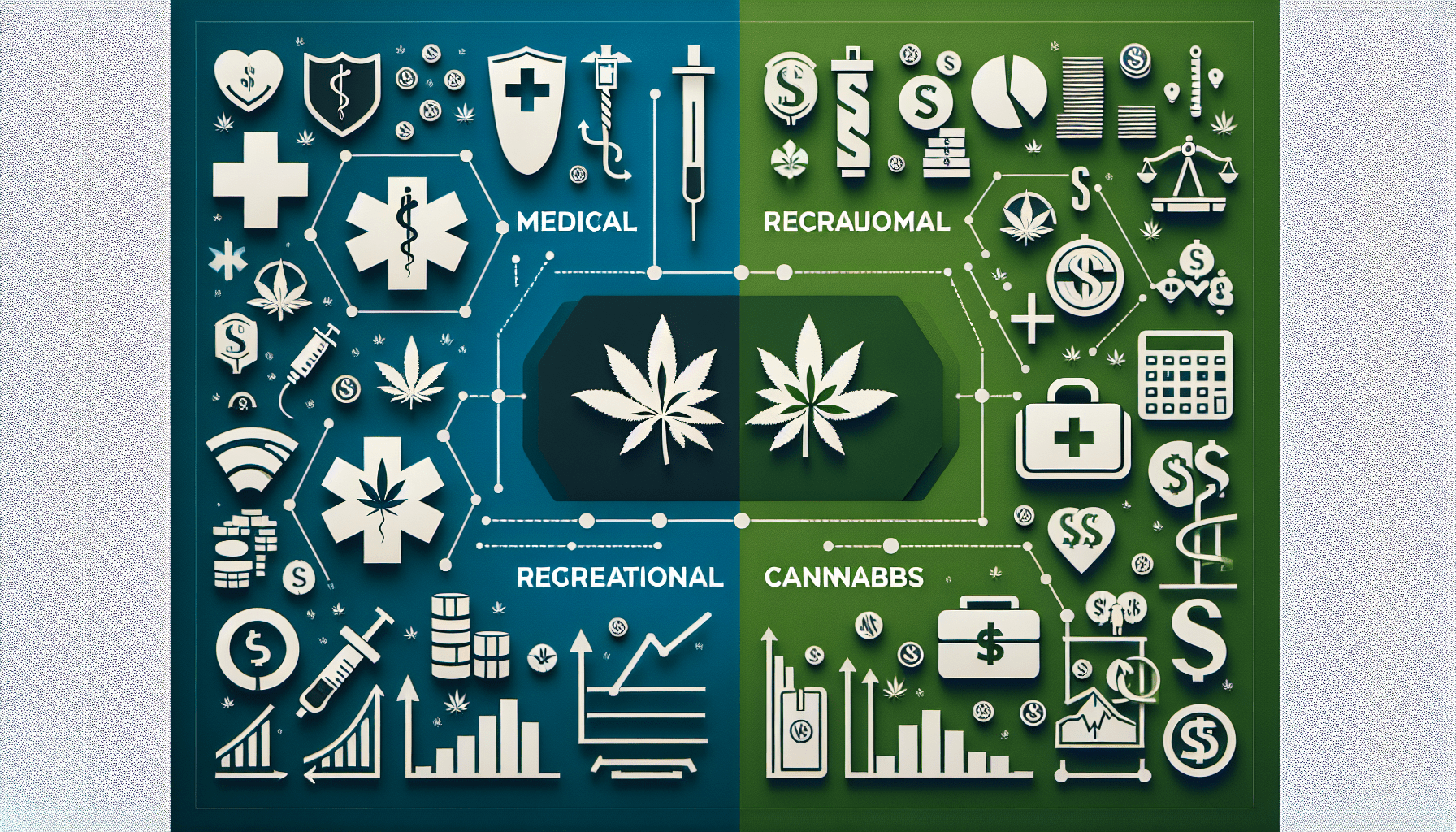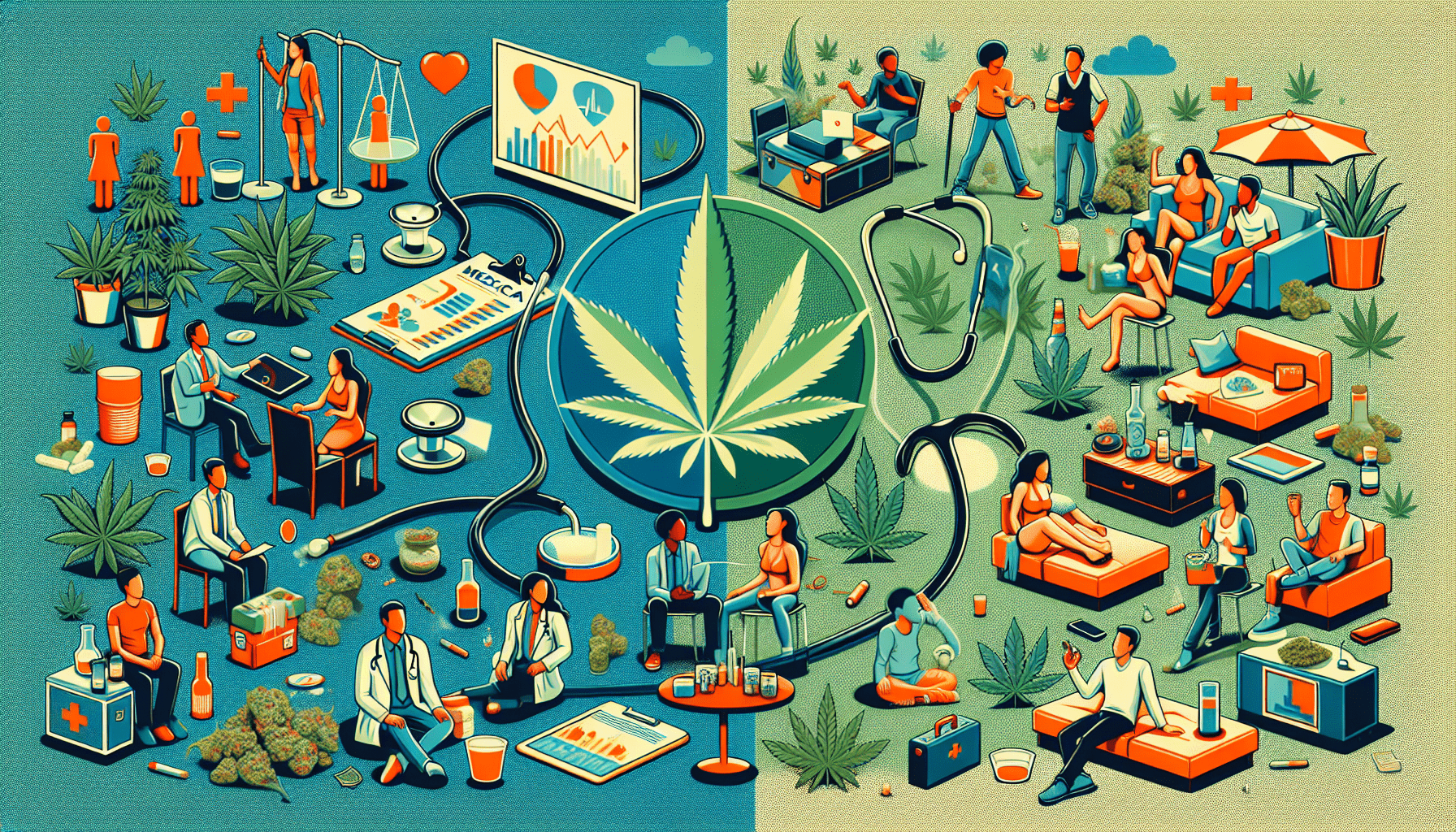So you’re curious about the differences between the medical and recreational cannabis markets? Well, you’ve come to the right place. In this article, we’ll be exploring the contrasting aspects of these two booming industries. From the regulations surrounding their use to the motivations behind consumer choices, we’ll uncover the unique dynamics that shape these markets. Whether you’re an avid user or simply interested in understanding the ins and outs of the cannabis world, get ready to discover the fascinating disparities between medical and recreational cannabis markets.
Legalization and Regulation

Different Approaches to Legalization
When it comes to the legalization of cannabis, different countries and states have implemented various approaches. Some jurisdictions have chosen to legalize both medical and recreational use, while others have only allowed medical cannabis. The decision to legalize recreational cannabis often follows after the legalization of medical cannabis, with policymakers acknowledging the potential benefits and economic potential of opening up the market to all adults.
Varying Regulatory Frameworks
The regulatory frameworks for medical and recreational cannabis also differ significantly. Medical cannabis regulations tend to be more stringent, focusing on ensuring patient safety, quality control, and professional oversight. These frameworks typically require more extensive licensing, record-keeping, and compliance with specific rules. On the other hand, regulations for recreational cannabis are generally less restrictive, with a greater emphasis on taxation and consumer protection.
Purpose and Intended Use
Medical Cannabis for Therapeutic Purposes
Medical cannabis is primarily intended for individuals seeking therapeutic relief from various medical conditions. It is often prescribed to patients by healthcare professionals for pain management, nausea, epilepsy, and other specific conditions. The purpose of medical cannabis is to provide a safe and regulated form of treatment for those who may benefit from its medicinal properties.
Recreational Cannabis for Personal Use and Enjoyment
In contrast, recreational cannabis is consumed for personal use and enjoyment. It does not require a specific medical condition for access or use. People who use cannabis recreationally do so for the psychoactive effects, relaxation, socialization, or simply as a way to unwind. The purpose of recreational cannabis is to provide a legal and regulated avenue for adults to responsibly enjoy cannabis without the need for medical authorization.
Patient Access and Eligibility

Medical Cannabis for Qualified Patients Only
Access to medical cannabis is typically restricted to qualified patients who have obtained a recommendation from a healthcare professional. This ensures that only individuals who can benefit from the therapeutic properties of cannabis have legal access to it. Patients need to meet specific criteria and may be required to provide medical documentation supporting their condition and the need for cannabis as part of their treatment plan.
Age Restrictions for Recreational Cannabis
Recreational cannabis, on the other hand, typically has age restrictions in place. Most jurisdictions require consumers to be at least 21 years old to purchase and possess recreational cannabis legally. These age restrictions aim to prevent underage consumption and regulate access to cannabis products that are intended for adult use only.
Medical Recommendations and Prescriptions

Medical Cannabis Requires Recommendation from Healthcare Professional
To access medical cannabis, patients must obtain a recommendation from a healthcare professional. This recommendation serves as a medical authorization and provides guidance on the appropriate strain, dosage, and consumption method. Recommendations are typically based on an evaluation of the patient’s medical history, symptoms, and treatment goals. They contribute to the overall monitoring and management of the patient’s condition.
Recreational Cannabis Doesn’t Require Medical Authorization
In contrast, recreational cannabis does not require any medical authorization. Consumers can simply visit a licensed retailer and purchase cannabis products without the need for a recommendation or prescription. The responsibility for determining the strain, dosage, and consumption method lies with the individual, and they can experiment with different products to find what works best for their preferences.
Product Selection and Availability

Medical Cannabis with a Focus on Therapeutic Strains
Medical cannabis often places a greater emphasis on therapeutic strains that are specifically cultivated and selected for their medicinal properties. These strains may contain higher levels of CBD (cannabidiol) and lower levels of THC (tetrahydrocannabinol), the psychoactive compound. The variety of products available to medical cannabis patients may include oils, tinctures, capsules, topicals, and edibles, tailored to meet specific medical needs.
Recreational Cannabis with a Wide Variety of Strains and Products
Recreational cannabis, on the other hand, offers a wider range of strains and products to cater to different preferences and experiences. The focus is on providing consumers with diverse options, including strains with higher THC content for those seeking a more potent psychoactive effect. Recreational cannabis products can include flowers, concentrates, edibles, beverages, and more, allowing individuals to choose based on their desired effects and consumption preferences.
Taxation and Pricing

Different Tax Rates Imposed on Medical and Recreational Cannabis
Taxation plays a significant role in the regulation of cannabis markets. In many jurisdictions, there are different tax rates imposed on medical and recreational cannabis. Medical cannabis is often subject to lower tax rates or even exempt from certain taxes altogether. This is due to the recognition of its status as a medical treatment and the desire to keep the cost of access reasonable for patients. Recreational cannabis, on the other hand, generally faces higher tax rates, which contribute to revenue generation for the governing bodies.
Medical Cannabis May Have Lower Taxation and Pricing
The lower taxation applied to medical cannabis can make it more affordable for patients who rely on it as part of their treatment. This can be particularly important for individuals with chronic conditions who require ongoing access to cannabis as a part of their healthcare regimen. By providing medical cannabis at a reduced cost, it ensures that patients can continue to afford their medication without undue financial burden.
Packaging and Labeling Requirements
Strict Packaging and Labeling Guidelines for Medical Cannabis
Medical cannabis typically has stricter packaging and labeling requirements. These regulations aim to ensure that patients receive accurate information about the product, including its composition, potency, and recommended dosage. Labels on medical cannabis products often include detailed instructions, warnings, and batch-specific information. The packaging must be child-resistant and tamper-evident to enhance safety and prevent accidental access.
Recreational Cannabis Packaging May Have More Freedom in Design
In the case of recreational cannabis, packaging guidelines may allow for more freedom in design and marketing. While still subject to regulations to prevent misleading claims and protect consumer safety, recreational cannabis packages may have more room for creative and appealing designs. This can contribute to the overall consumer experience and aesthetic appeal, but it must still prioritize safety and responsible use.
Research and Development
More Focus on Medical Research and Development
Medical cannabis markets often see a greater emphasis on research and development. The therapeutic potential of cannabis is continually being explored, with ongoing studies investigating its efficacy for various conditions. This includes clinical trials, observational research, and preclinical studies aimed at understanding the potential benefits and risks associated with medical cannabis use. The insights gained from this research help inform medical professionals and policymakers, shaping the future of medical cannabis treatments.
Limited Research in Recreational Cannabis
Compared to medical cannabis, research in recreational cannabis is relatively limited. The focus is often more on recreational use patterns, consumer behavior, and market trends. While some studies may analyze the safety and public health aspects of recreational cannabis, the level of scientific research dedicated specifically to recreational use is generally less extensive. This may be due to the lower perception of risk associated with responsible recreational use and the prioritization of medical research.
Medical Dispensaries vs. Recreational Stores
Dedicated Medical Dispensaries with Trained Staff
In jurisdictions where both medical and recreational cannabis are legalized, dedicated medical dispensaries are often established to cater specifically to medical cannabis patients. These dispensaries typically have trained staff members who can provide guidance on strains, dosages, and consumption methods based on patients’ specific needs. Medical dispensaries may also offer additional services such as consultations, support groups, and educational resources to aid patients in managing their condition effectively.
Recreational Stores Catering to a Broader Customer Base
Recreational stores, on the other hand, are designed to cater to a broader customer base of adult consumers. While knowledgeable staff may still be available to provide guidance and answer questions, the emphasis is more on creating a welcoming atmosphere and offering a wide selection of cannabis products that appeal to recreational users. These stores often prioritize convenience, aesthetic appeal, and a positive shopping experience to attract and retain customers.
Social Stigma and Perception
Medical Cannabis Often Viewed More Favorably
In recent years, the perception of medical cannabis has shifted, with greater acceptance and understanding of its potential benefits. Medical cannabis is often viewed more favorably than recreational cannabis as it is seen as a legitimate treatment option for individuals with specific medical conditions. This shift in perception has resulted in increased support for legislation and policies that prioritize patient access to medical cannabis.
Recreational Cannabis Still Faces Social Stigma
Despite the growing acceptance of cannabis in general, recreational cannabis still carries a social stigma in some communities and cultures. The recreational use of cannabis is often associated with negative stereotypes and assumptions about drug abuse or irresponsible behavior. These perceptions can vary widely based on cultural, social, and generational factors, shaping public opinion and influencing the regulatory environment surrounding recreational cannabis.
In conclusion, the legalization and regulation of cannabis differ significantly between medical and recreational markets. From access and eligibility to packaging and taxation, each market has distinct characteristics. Medical cannabis focuses on therapeutic purposes, patient needs, and stringent regulations to ensure safety and quality. Recreational cannabis, however, caters to adult consumers seeking personal use and enjoyment, with a wider variety of strains and products available. While medical cannabis is often viewed more favorably, recreational cannabis still faces social stigma in some areas. As the cannabis industry continues to evolve, understanding these differences is crucial for policymakers, healthcare professionals, and consumers alike.
